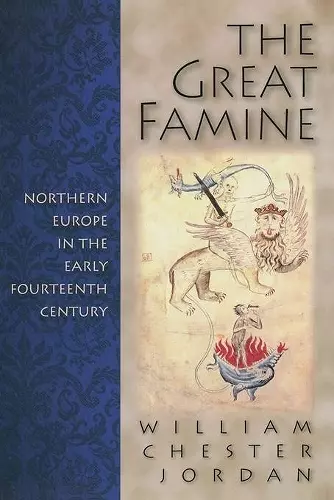The Great Famine
Northern Europe in the Early Fourteenth Century
Format:Paperback
Publisher:Princeton University Press
Published:9th Mar '98
Currently unavailable, and unfortunately no date known when it will be back

Pestilence and War have had their historians. Famine now has its own with this brilliantly written masterpiece of historical anthropology. -- "Jacques Le Goff" Superb detective work, as all good historical research should be, it is well organized, fast moving, and above all else, persuasive. Jordan spins a horrifying tale, dealing, in turn, with the nature of the calamity and how it affected the nobility, peasants, and townfolk--starvation, disease, displacement, and death... Yes, this is true scholarship, but also a riveting tale as well. -- "The Virginia Quarterly Review"
The horrors of the Great Famine (1315-1322), one of the severest catastrophes ever to strike northern Europe. This work provides a comprehensive inquiry into the Famine from Ireland to western Poland, from Scandinavia to central France and western Germany.The horrors of the Great Famine (1315-1322), one of the severest catastrophes ever to strike northern Europe, lived on for centuries in the minds of Europeans who recalled tales of widespread hunger, class warfare, epidemic disease, frighteningly high mortality, and unspeakable crimes. Until now, no one has offered a perspective of what daily life was actually like throughout the entire region devastated by this crisis, nor has anyone probed far into its causes. Here, the distinguished historian William Jordan provides the first comprehensive inquiry into the Famine from Ireland to western Poland, from Scandinavia to central France and western Germany. He produces a rich cultural history of medieval community life, drawing his evidence from such sources as meteorological and agricultural records, accounts kept by monasteries providing for the needy, and documentation of military campaigns. Whereas there has been a tendency to describe the food shortages as a result of simply bad weather or else poor economic planning, Jordan sets the stage so that we see the complex interplay of social and environmental factors that caused this particular disaster and allowed it to continue for so long. Jordan begins with a description of medieval northern Europe at its demographic peak around 1300, by which time the region had achieved a sophisticated level of economic integration. He then looks at problems that, when combined with years of inundating rains and brutal winters, gnawed away at economic stability. From animal diseases and harvest failures to volatile prices, class antagonism, and distribution breakdowns brought on by constant war, northern Europeans felt helplessly besieged by acts of an angry God--although a cessation of war and a more equitable distribution of resources might have lessened the severity of the food shortages. Throughout Jordan interweaves vivid historical detail with a sharp analysis of why certain responses to the famine failed. He ultimately shows that while the northern European economy did recover quickly, the Great Famine ushered in a period of social instability that had serious repercussions for generations to come.
Winner of the 2000 Haskins Medal, Medieval Academy of America One of Choice's Outstanding Academic Titles for 1996 "In this important new synthesis of the causes, course, and consequences of the Great Famine, Jordan offers a corrective to the view that after its initial crippling effects, famine continued to afflict Europe until the ultimate devastation of the Black Death... A richly detailed cultural history that considers significant regional variations and stresses the event's human dimension, including its manifold and different effects in rural and urban contexts and on people of differing age, status, and power... This will become the standard work on the subject."--Choice "Ever since the publication of Barbara Tuchman's A Distant Mirror, many readers have had a sneaking suspicion that the 14th century is uncannily similar to our own. Anyone who takes up this book in hopes of finding a new Tuchman will find something better, though: a work of great depth written in a scholarly though engaging way... [T]he impressive scholarship ... deserves to be appreciated for its own merits. Among the many virtues of this readable work are the corrections of many common misperceptions of the Middle Ages and a bibliography that is extensive and impressive... "--Publishers Weekly "A richly detailed cultural history... This will become the standard work on the subject."--Choice "Anyone who takes up this book in hopes of finding a new Tuchman will find something better, though: a work of great depth written in a scholarly though engaging way."--Publishers Weekly
- Runner-up for Choice Magazine Outstanding Reference/Academic Book Award 1996
ISBN: 9780691058917
Dimensions: unknown
Weight: 482g
328 pages